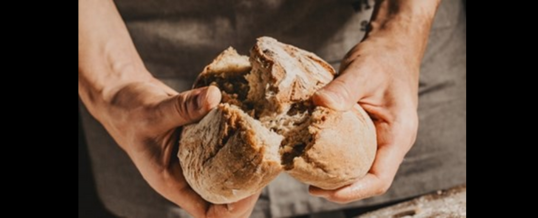
…in the breaking of the bread
The Resurrection of Jesus is the central event in the life of the Church. It’s so important that we must spend 50 days celebrating it, right up until the Feast of Pentecost (June 8th this year). One of the classic “Resurrection stories” is the stories we’ve tentatively titled: The Disciples on the Road to Emmaus (Lk. 24: 13-35). In this story the resurrected Lord appeared to two dejected disciples who were on the way to a place called Emmaus. By the way, Biblical scholars and archeologists have never been able to locate such a place called “Emmaus.” It doesn’t exist. In other words, the despondent disciples are going to a place that doesn’t exist—they are going nowhere. Grief does that. It stops us in our tracks. It stuns us. We’re lost, going nowhere. We can’t think of the road ahead. All we see are dead ends. We’re going nowhere.
The disciples on the road to Emmaus, in their sadness and desperation, do not recognize that this stranger, who is walking with them, is indeed the Risen Jesus. They say to this unfamiliar companion, “Stay with us.” Apparently, that’s all it takes. All you have to do is ask him to stay, and he does.
At some point during the visit, the “stranger” breaks bread with them. In the breaking of the bread, their eyes were opened, they recognized him, and he vanished. (Where he went, I have no idea. My Spidey senses tell me he went back to the road to find other lost “sheep,” other grieving and hopeless people).
The story ends with, “…how he (Jesus) had been made known to them in the breaking of the bread.” Jesus isn’t so much made known to them in the bread but in the breaking of the bread.
From a Biblical, symbolic point of view, what is bread? Bread is people; it’s life. Bread is all that you are. Jesus offers his disciples bread at the Last Supper and says, “This is my body, given for you.” His body isn’t just his flesh. “Body” here means the totality of who he is—physically, mentally, spiritually, sexually, emotionally— EVERYTHING. By giving his body in the form of bread, Jesus is giving them everything. He holds nothing back…even to Judas, who has already betrayed Jesus for 30 pieces of silver!
If bread is life, then it will have to be broken. Ah, %#@$!
Couldn’t there be another way? A seed, if it is to become anything more than just a seed, must be broken. Once broken, it grow, matures and produces a harvest 30,60, or even 100-fold. It is in the breaking of the bread that Jesus is known and bears fruit in our lives…30, 60, and even 100-fold.
Where is the broken bread—the revelation of the presence of Christ—in our world? Who are the broken ones in our world who, inadvertently, point us to Christ? Do we recognize Christ in the broken people of the 2SLGBTQ community? What about the broken people who struggle with alcohol and drug addictions? Are not the separated and divorced broken as well? Who in our family is broken? Who are the broken ones who have been hurt by the institutional Church? In the broken lives of those living in shelters, could our eyes be opened? Could we recognize Jesus, even briefly, before he vanishes from our sight?
I wish there were no broken people in the world, including me, but only people who are whole. I wish Jesus didn’t have to be broken upon a Cross, especially where his only crime was love and mercy. Yet, in the wisdom of God (which is way beyond my intelligence) his Son was recognized not in the bread but in the breaking of the bread. Our litmus test of Catholic orthodoxy is such that we insist that people believe in Jesus’ presence in the Real Presence in the tabernacle. I’m all for it. I just wish we had the same determination and drive to recognize Jesus in the broken bodies around us. Maybe, just maybe, our eyes also would be opened. Until that happens, we’re on the way to Emmaus…a place that doesn’t exist.
~Fr. Phil
MAY
2025

About the Author: